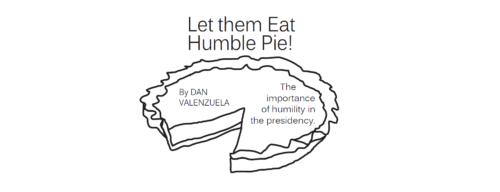The importance of humility in the presidency.
By DAN VALENZUELA
This past January in Davos, Switzerland, elite business people, academics, and media personalities of the world gathered to discuss ways to address global problems at the World Economic Forum. Last year, in the face of rising populism, the consensus among attendants was that Donald Trump would not make it to the White House. Martin Sorrell, chief executive of advertising giant WPP, thought Hillary Clinton would win no matter what. Former Harvard professor Niall Ferguson was looking forward to “Trump’s humiliation.”
This year, the Davoisie finally understood how wrong they were; they were at a loss for words as to what this populist trend towards Trump’s presidency meant for the future. Considering how wrong these elite were—these strangers whose power influences our lives—I think it’s important to ask who the elite of the future should look like.
For many of those who want four more years of Barack Obama, the future elite should look like the former president. As president, he was youthful, affable, smart, cool-headed, and tactful. Yet he failed at what I believe is absolutely necessary for the future: he failed to be humble enough.
What do I mean by humble? I don’t mean the state of having low self-esteem, as suggested by the Latin root ‘humilis’ which means ‘low.’ Rather, I mean being grounded and close to the earth, which is suggested by the other related Latin root ‘humus,’ meaning ‘earth.’
Although humility is often thought of as a virtue—or in extremes, a vice—its roots suggest that it’s ultimately grounded in morally-neutral knowledge. Humility is simply the state of knowing the world and one’s place in it. And to be humbled means to be given knowledge of the world and one’s place in it, whether it be high or low, to the left or to the right.
This knowledge is what Mr. Obama and other elites do not have enough of. Living in a globalized world with power and influence means that one’s actions lead to an exponential number of consequences. It also means that understanding and foreseeing these consequences requires immense humility. Mr. Obama’s presidency can attest to this.
Coming into his first term as president, Mr. Obama believed his presidency could be transformational and help unify the country. However the Democratic defeats in the 2010 midterm elections showed him that his influence upon the country was limited, forcing him to resort to his foreign policy powers in his second term.
Although Mr. Obama should have been humbled after being forced into the foreign policy arena, he still failed to understand why his influence was limited at home. Despite seeing the divisions in America after seven years of being President, he optimistically said in early 2016, “I have a lot of faith in the American people” and “I continue to believe Mr. Trump will not be President.”
These false beliefs that Mr. Obama had are even more surprising given his ability to gain the trust of the American people in two elections. Such an ability must be the result of some understanding and humility. Yet in the span of eight years of being entrusted the presidency, Mr. Obama failed to be close enough to the ground and the people to understand the country’s turn toward dangerous people like Mr. Trump.
Mr. Obama has not been alone in being wrong, however. The political and economic elite have all but said “let them eat cake!” to working-class Americans in misunderstanding their needs. Such a lack of humility has arguably lead to the rise in popular resentment against established elites, a resentment that will be around for the foreseeable future.
As much as I disagree with Mr. Trump’s policies and am disgusted by his rhetoric, the fact remains that he recognized and understood the resentful Americans that voted him into power. Contrary to others’ predictions, Mr. Trump knew his place in relation to these people and appropriately filled the disruptor role that they wanted. This is all true despite the real concern that such humility was used in service of his own self-interest, or that such humility is narrow in scope.
The powerful leaders of tomorrow will need to emulate Mr. Trump in this sense. They will need to gain as much as possible from the knowledge of humility, even if that knowledge goes against popular opinion. And if we hope our leaders to be more than mere disruptors, they will also need the integrity and character to turn humility into reliable virtue, traits that Mr. Trump does not possess.
Now that Mr. Trump is President, his place in the world has dramatically changed. He inherits an office that has expanded its powers over the years, making any action he takes increasingly consequential. To do the best and prevent the worst for the country as president, Mr. Trump will require more humility than he had as a candidate.
But as we have seen in Mr. Obama, achieving such humility is difficult. And, unfortunately for us, it remains to be seen whether President Trump and the other elite will be as humble as the country needs them to be.
Dan Valenzuela (dvalenzuela@college.harvard.edu) is still trying to get his head out of the clouds and down to earth.

